BUS301: Capstone Project: Ethical Dilemma and CSR at Devil's Den
VerifiedAdded on 2023/06/08
|8
|1398
|406
Report
AI Summary
This report, prepared for BUS301, addresses the ethical dilemma at Devil's Den, a bar where student employees are consuming and providing free food, violating business ethics and the company's written code. The report emphasizes the importance of Corporate Social Responsibility (CSR) and its application within the context of Devil's Den, highlighting the need for ethical considerations and employee performance monitoring. It explores alternative solutions, such as alerting higher management, resigning, or communicating the issue to a manager, considering their implications on the company's culture and future. The lack of CSR activities, inadequate management control systems, and unethical employee practices are identified as key issues. The report concludes by stressing the importance of a healthy corporate culture and active participation in organizational values to avoid such problems and ensure the company's wellbeing. The report also references several academic papers and journals to support its findings and recommendations.
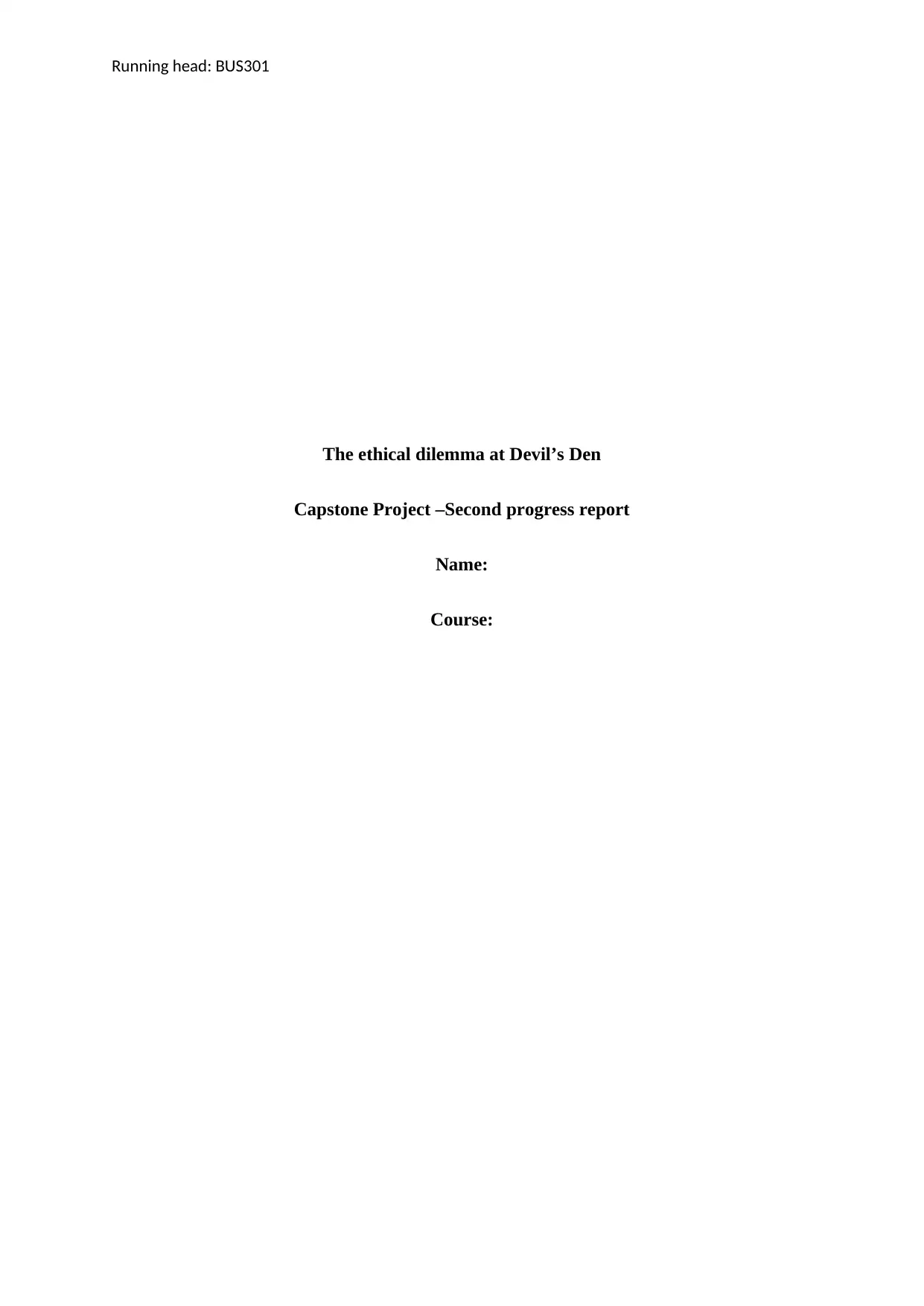
Running head: BUS301
The ethical dilemma at Devil’s Den
Capstone Project –Second progress report
Name:
Course:
The ethical dilemma at Devil’s Den
Capstone Project –Second progress report
Name:
Course:
Paraphrase This Document
Need a fresh take? Get an instant paraphrase of this document with our AI Paraphraser
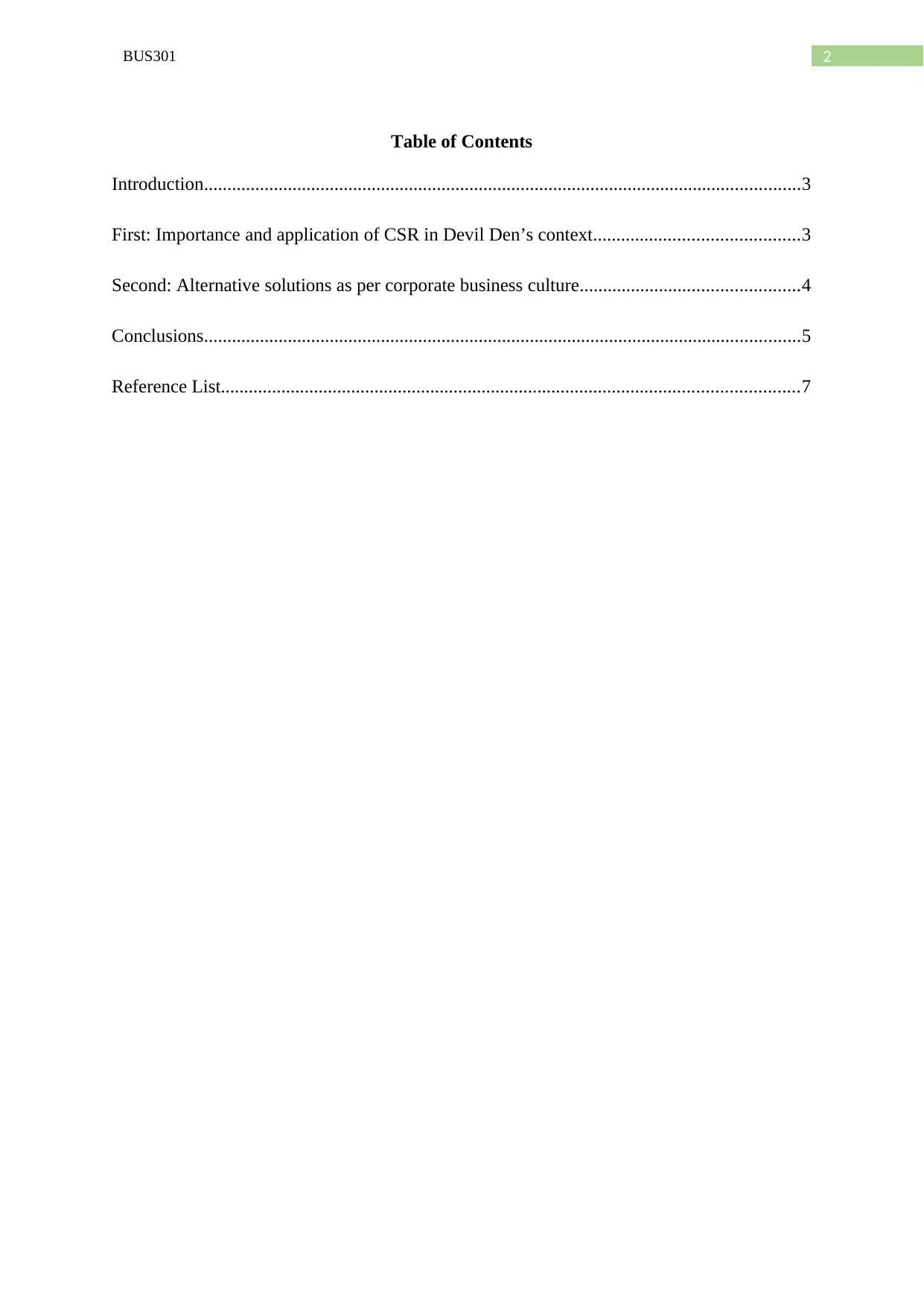
2BUS301
Table of Contents
Introduction................................................................................................................................3
First: Importance and application of CSR in Devil Den’s context............................................3
Second: Alternative solutions as per corporate business culture...............................................4
Conclusions................................................................................................................................5
Reference List............................................................................................................................7
Table of Contents
Introduction................................................................................................................................3
First: Importance and application of CSR in Devil Den’s context............................................3
Second: Alternative solutions as per corporate business culture...............................................4
Conclusions................................................................................................................................5
Reference List............................................................................................................................7
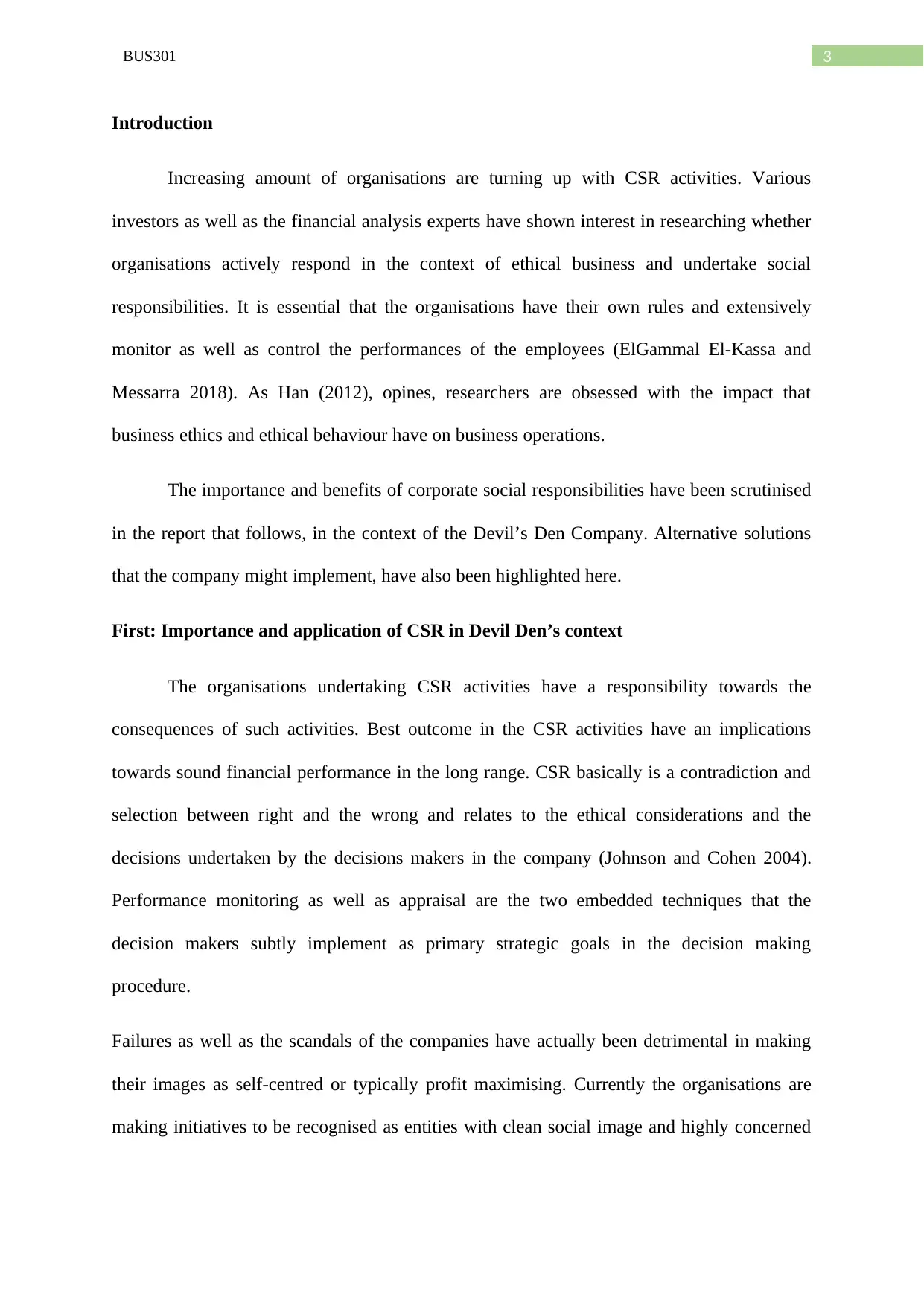
3BUS301
Introduction
Increasing amount of organisations are turning up with CSR activities. Various
investors as well as the financial analysis experts have shown interest in researching whether
organisations actively respond in the context of ethical business and undertake social
responsibilities. It is essential that the organisations have their own rules and extensively
monitor as well as control the performances of the employees (ElGammal El-Kassa and
Messarra 2018). As Han (2012), opines, researchers are obsessed with the impact that
business ethics and ethical behaviour have on business operations.
The importance and benefits of corporate social responsibilities have been scrutinised
in the report that follows, in the context of the Devil’s Den Company. Alternative solutions
that the company might implement, have also been highlighted here.
First: Importance and application of CSR in Devil Den’s context
The organisations undertaking CSR activities have a responsibility towards the
consequences of such activities. Best outcome in the CSR activities have an implications
towards sound financial performance in the long range. CSR basically is a contradiction and
selection between right and the wrong and relates to the ethical considerations and the
decisions undertaken by the decisions makers in the company (Johnson and Cohen 2004).
Performance monitoring as well as appraisal are the two embedded techniques that the
decision makers subtly implement as primary strategic goals in the decision making
procedure.
Failures as well as the scandals of the companies have actually been detrimental in making
their images as self-centred or typically profit maximising. Currently the organisations are
making initiatives to be recognised as entities with clean social image and highly concerned
Introduction
Increasing amount of organisations are turning up with CSR activities. Various
investors as well as the financial analysis experts have shown interest in researching whether
organisations actively respond in the context of ethical business and undertake social
responsibilities. It is essential that the organisations have their own rules and extensively
monitor as well as control the performances of the employees (ElGammal El-Kassa and
Messarra 2018). As Han (2012), opines, researchers are obsessed with the impact that
business ethics and ethical behaviour have on business operations.
The importance and benefits of corporate social responsibilities have been scrutinised
in the report that follows, in the context of the Devil’s Den Company. Alternative solutions
that the company might implement, have also been highlighted here.
First: Importance and application of CSR in Devil Den’s context
The organisations undertaking CSR activities have a responsibility towards the
consequences of such activities. Best outcome in the CSR activities have an implications
towards sound financial performance in the long range. CSR basically is a contradiction and
selection between right and the wrong and relates to the ethical considerations and the
decisions undertaken by the decisions makers in the company (Johnson and Cohen 2004).
Performance monitoring as well as appraisal are the two embedded techniques that the
decision makers subtly implement as primary strategic goals in the decision making
procedure.
Failures as well as the scandals of the companies have actually been detrimental in making
their images as self-centred or typically profit maximising. Currently the organisations are
making initiatives to be recognised as entities with clean social image and highly concerned
⊘ This is a preview!⊘
Do you want full access?
Subscribe today to unlock all pages.

Trusted by 1+ million students worldwide
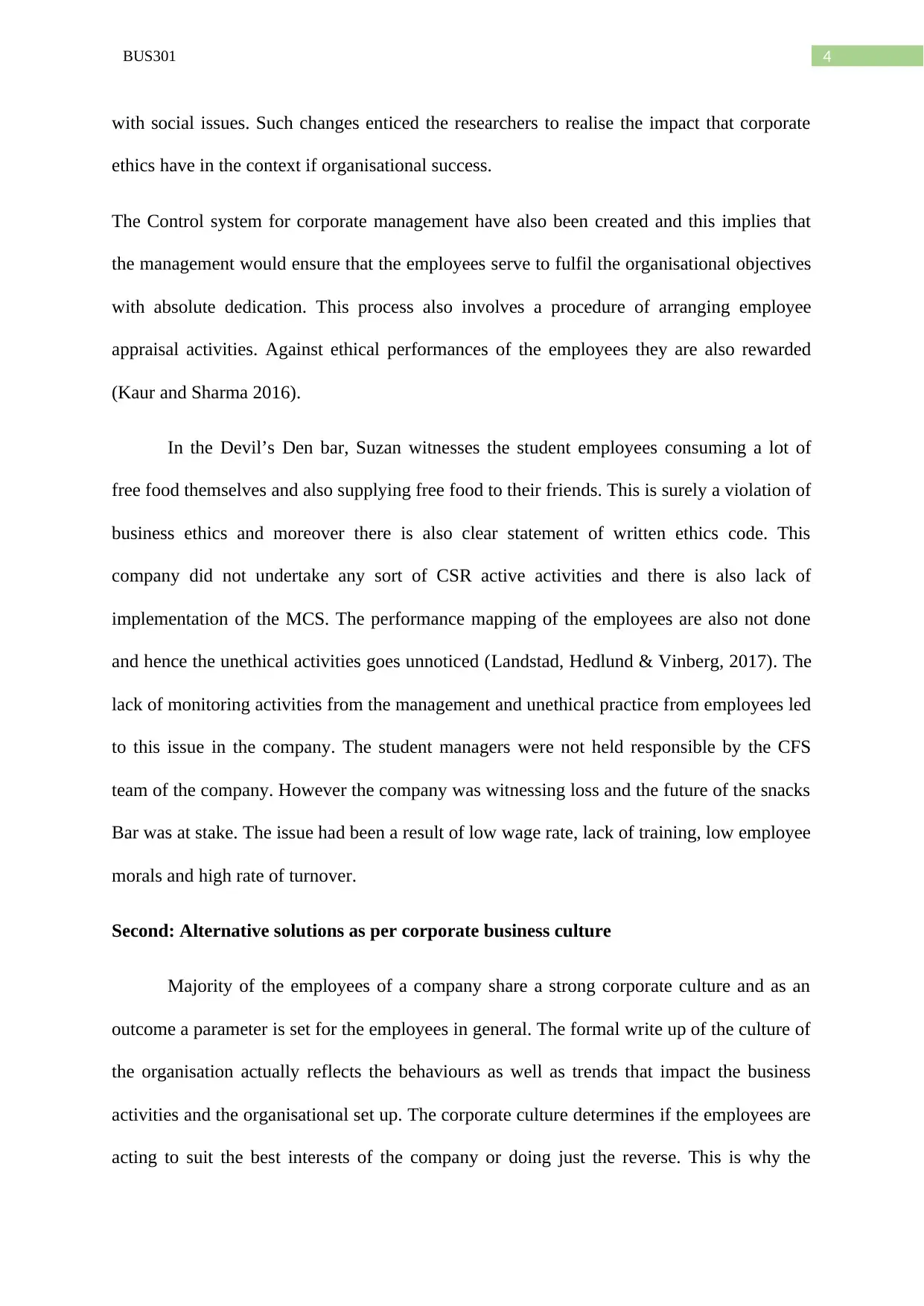
4BUS301
with social issues. Such changes enticed the researchers to realise the impact that corporate
ethics have in the context if organisational success.
The Control system for corporate management have also been created and this implies that
the management would ensure that the employees serve to fulfil the organisational objectives
with absolute dedication. This process also involves a procedure of arranging employee
appraisal activities. Against ethical performances of the employees they are also rewarded
(Kaur and Sharma 2016).
In the Devil’s Den bar, Suzan witnesses the student employees consuming a lot of
free food themselves and also supplying free food to their friends. This is surely a violation of
business ethics and moreover there is also clear statement of written ethics code. This
company did not undertake any sort of CSR active activities and there is also lack of
implementation of the MCS. The performance mapping of the employees are also not done
and hence the unethical activities goes unnoticed (Landstad, Hedlund & Vinberg, 2017). The
lack of monitoring activities from the management and unethical practice from employees led
to this issue in the company. The student managers were not held responsible by the CFS
team of the company. However the company was witnessing loss and the future of the snacks
Bar was at stake. The issue had been a result of low wage rate, lack of training, low employee
morals and high rate of turnover.
Second: Alternative solutions as per corporate business culture
Majority of the employees of a company share a strong corporate culture and as an
outcome a parameter is set for the employees in general. The formal write up of the culture of
the organisation actually reflects the behaviours as well as trends that impact the business
activities and the organisational set up. The corporate culture determines if the employees are
acting to suit the best interests of the company or doing just the reverse. This is why the
with social issues. Such changes enticed the researchers to realise the impact that corporate
ethics have in the context if organisational success.
The Control system for corporate management have also been created and this implies that
the management would ensure that the employees serve to fulfil the organisational objectives
with absolute dedication. This process also involves a procedure of arranging employee
appraisal activities. Against ethical performances of the employees they are also rewarded
(Kaur and Sharma 2016).
In the Devil’s Den bar, Suzan witnesses the student employees consuming a lot of
free food themselves and also supplying free food to their friends. This is surely a violation of
business ethics and moreover there is also clear statement of written ethics code. This
company did not undertake any sort of CSR active activities and there is also lack of
implementation of the MCS. The performance mapping of the employees are also not done
and hence the unethical activities goes unnoticed (Landstad, Hedlund & Vinberg, 2017). The
lack of monitoring activities from the management and unethical practice from employees led
to this issue in the company. The student managers were not held responsible by the CFS
team of the company. However the company was witnessing loss and the future of the snacks
Bar was at stake. The issue had been a result of low wage rate, lack of training, low employee
morals and high rate of turnover.
Second: Alternative solutions as per corporate business culture
Majority of the employees of a company share a strong corporate culture and as an
outcome a parameter is set for the employees in general. The formal write up of the culture of
the organisation actually reflects the behaviours as well as trends that impact the business
activities and the organisational set up. The corporate culture determines if the employees are
acting to suit the best interests of the company or doing just the reverse. This is why the
Paraphrase This Document
Need a fresh take? Get an instant paraphrase of this document with our AI Paraphraser
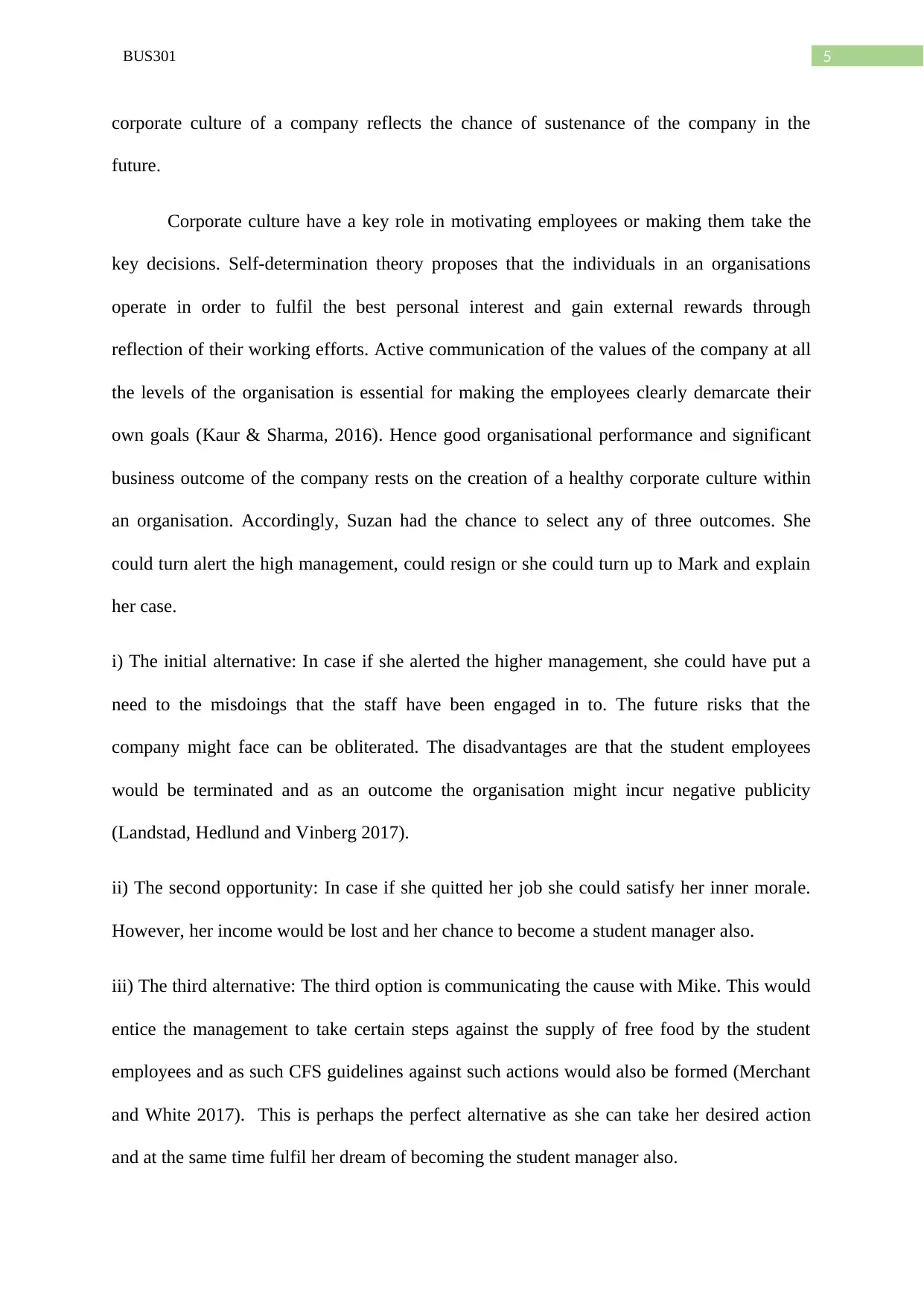
5BUS301
corporate culture of a company reflects the chance of sustenance of the company in the
future.
Corporate culture have a key role in motivating employees or making them take the
key decisions. Self-determination theory proposes that the individuals in an organisations
operate in order to fulfil the best personal interest and gain external rewards through
reflection of their working efforts. Active communication of the values of the company at all
the levels of the organisation is essential for making the employees clearly demarcate their
own goals (Kaur & Sharma, 2016). Hence good organisational performance and significant
business outcome of the company rests on the creation of a healthy corporate culture within
an organisation. Accordingly, Suzan had the chance to select any of three outcomes. She
could turn alert the high management, could resign or she could turn up to Mark and explain
her case.
i) The initial alternative: In case if she alerted the higher management, she could have put a
need to the misdoings that the staff have been engaged in to. The future risks that the
company might face can be obliterated. The disadvantages are that the student employees
would be terminated and as an outcome the organisation might incur negative publicity
(Landstad, Hedlund and Vinberg 2017).
ii) The second opportunity: In case if she quitted her job she could satisfy her inner morale.
However, her income would be lost and her chance to become a student manager also.
iii) The third alternative: The third option is communicating the cause with Mike. This would
entice the management to take certain steps against the supply of free food by the student
employees and as such CFS guidelines against such actions would also be formed (Merchant
and White 2017). This is perhaps the perfect alternative as she can take her desired action
and at the same time fulfil her dream of becoming the student manager also.
corporate culture of a company reflects the chance of sustenance of the company in the
future.
Corporate culture have a key role in motivating employees or making them take the
key decisions. Self-determination theory proposes that the individuals in an organisations
operate in order to fulfil the best personal interest and gain external rewards through
reflection of their working efforts. Active communication of the values of the company at all
the levels of the organisation is essential for making the employees clearly demarcate their
own goals (Kaur & Sharma, 2016). Hence good organisational performance and significant
business outcome of the company rests on the creation of a healthy corporate culture within
an organisation. Accordingly, Suzan had the chance to select any of three outcomes. She
could turn alert the high management, could resign or she could turn up to Mark and explain
her case.
i) The initial alternative: In case if she alerted the higher management, she could have put a
need to the misdoings that the staff have been engaged in to. The future risks that the
company might face can be obliterated. The disadvantages are that the student employees
would be terminated and as an outcome the organisation might incur negative publicity
(Landstad, Hedlund and Vinberg 2017).
ii) The second opportunity: In case if she quitted her job she could satisfy her inner morale.
However, her income would be lost and her chance to become a student manager also.
iii) The third alternative: The third option is communicating the cause with Mike. This would
entice the management to take certain steps against the supply of free food by the student
employees and as such CFS guidelines against such actions would also be formed (Merchant
and White 2017). This is perhaps the perfect alternative as she can take her desired action
and at the same time fulfil her dream of becoming the student manager also.
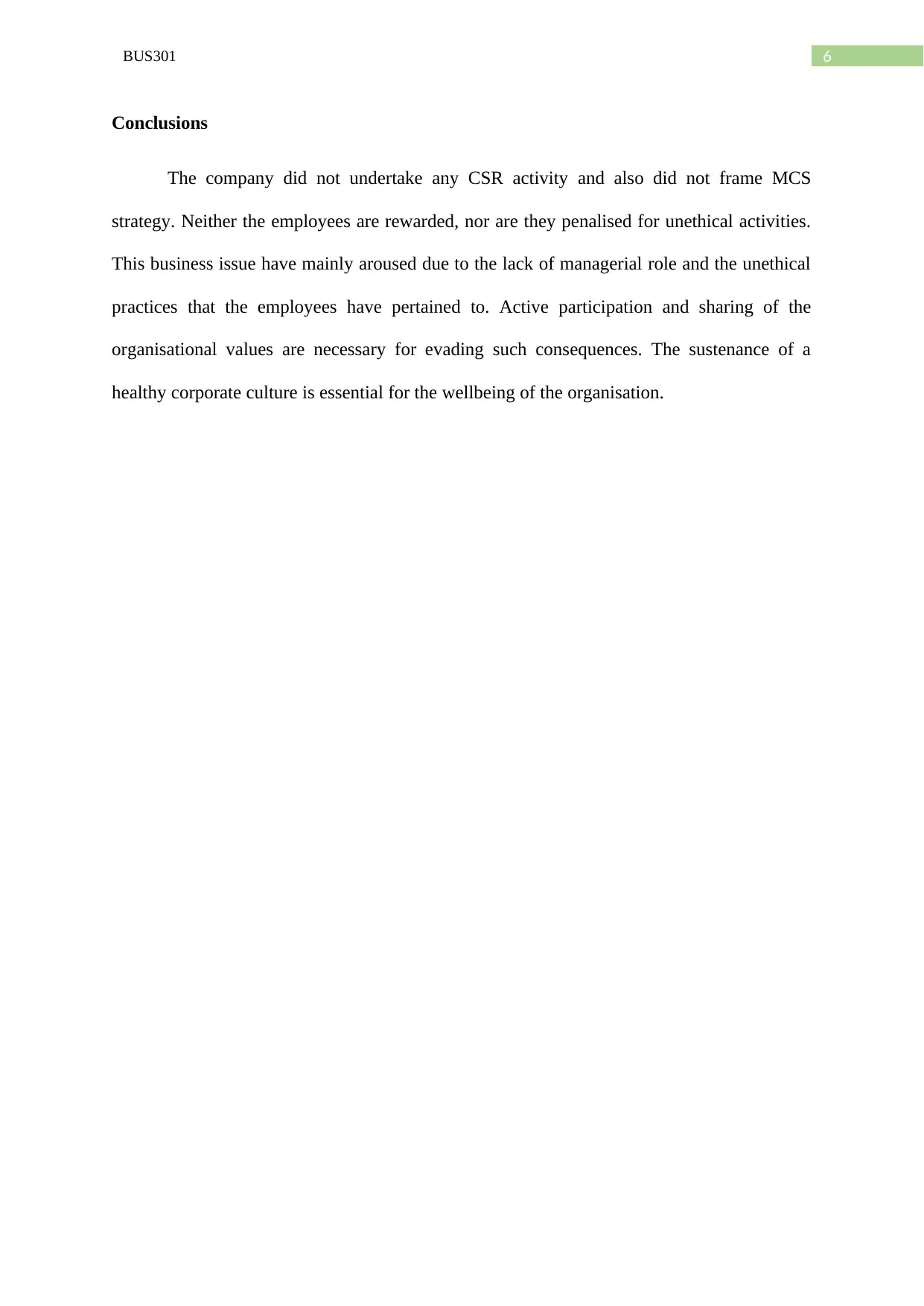
6BUS301
Conclusions
The company did not undertake any CSR activity and also did not frame MCS
strategy. Neither the employees are rewarded, nor are they penalised for unethical activities.
This business issue have mainly aroused due to the lack of managerial role and the unethical
practices that the employees have pertained to. Active participation and sharing of the
organisational values are necessary for evading such consequences. The sustenance of a
healthy corporate culture is essential for the wellbeing of the organisation.
Conclusions
The company did not undertake any CSR activity and also did not frame MCS
strategy. Neither the employees are rewarded, nor are they penalised for unethical activities.
This business issue have mainly aroused due to the lack of managerial role and the unethical
practices that the employees have pertained to. Active participation and sharing of the
organisational values are necessary for evading such consequences. The sustenance of a
healthy corporate culture is essential for the wellbeing of the organisation.
⊘ This is a preview!⊘
Do you want full access?
Subscribe today to unlock all pages.

Trusted by 1+ million students worldwide
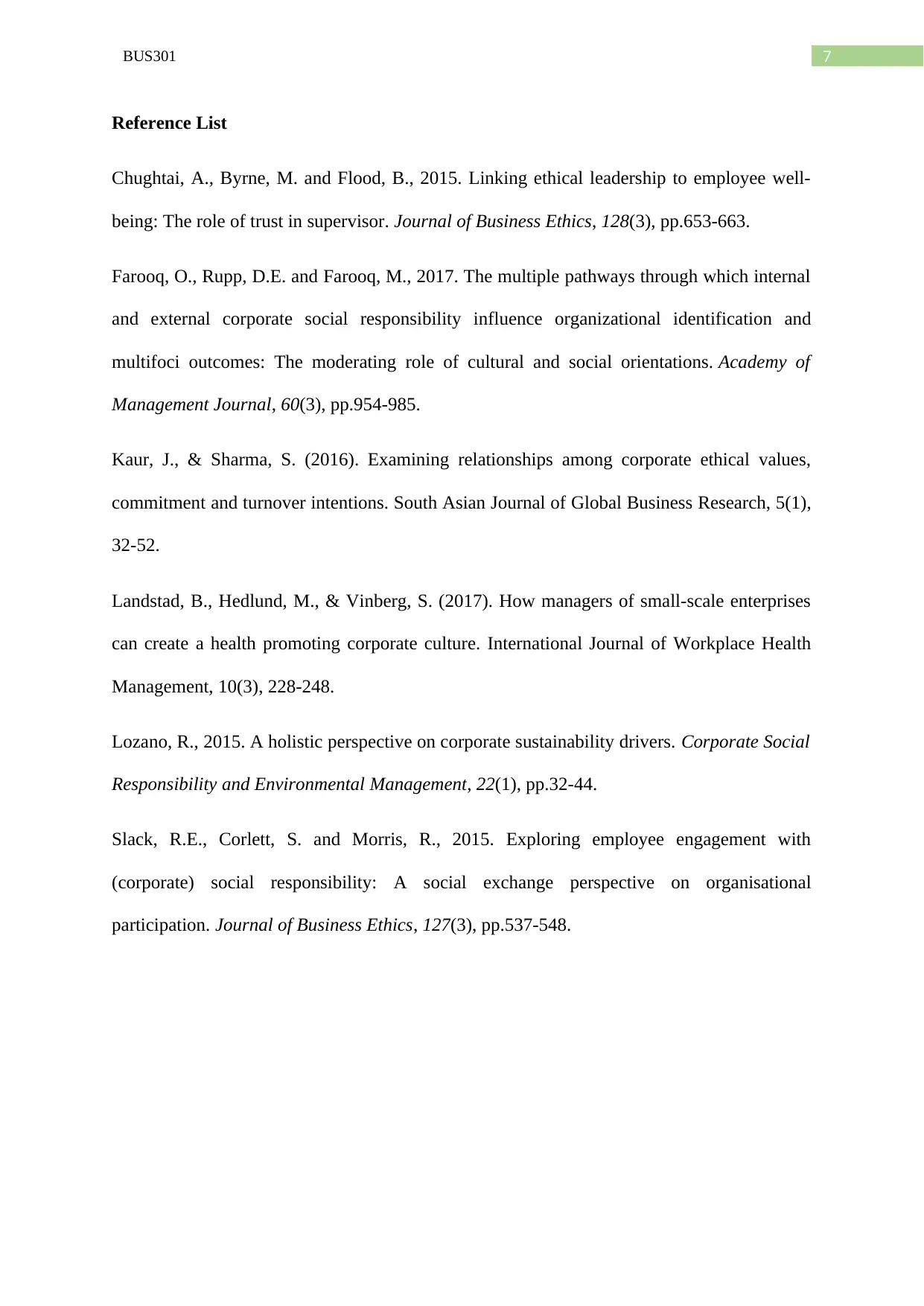
7BUS301
Reference List
Chughtai, A., Byrne, M. and Flood, B., 2015. Linking ethical leadership to employee well-
being: The role of trust in supervisor. Journal of Business Ethics, 128(3), pp.653-663.
Farooq, O., Rupp, D.E. and Farooq, M., 2017. The multiple pathways through which internal
and external corporate social responsibility influence organizational identification and
multifoci outcomes: The moderating role of cultural and social orientations. Academy of
Management Journal, 60(3), pp.954-985.
Kaur, J., & Sharma, S. (2016). Examining relationships among corporate ethical values,
commitment and turnover intentions. South Asian Journal of Global Business Research, 5(1),
32-52.
Landstad, B., Hedlund, M., & Vinberg, S. (2017). How managers of small-scale enterprises
can create a health promoting corporate culture. International Journal of Workplace Health
Management, 10(3), 228-248.
Lozano, R., 2015. A holistic perspective on corporate sustainability drivers. Corporate Social
Responsibility and Environmental Management, 22(1), pp.32-44.
Slack, R.E., Corlett, S. and Morris, R., 2015. Exploring employee engagement with
(corporate) social responsibility: A social exchange perspective on organisational
participation. Journal of Business Ethics, 127(3), pp.537-548.
Reference List
Chughtai, A., Byrne, M. and Flood, B., 2015. Linking ethical leadership to employee well-
being: The role of trust in supervisor. Journal of Business Ethics, 128(3), pp.653-663.
Farooq, O., Rupp, D.E. and Farooq, M., 2017. The multiple pathways through which internal
and external corporate social responsibility influence organizational identification and
multifoci outcomes: The moderating role of cultural and social orientations. Academy of
Management Journal, 60(3), pp.954-985.
Kaur, J., & Sharma, S. (2016). Examining relationships among corporate ethical values,
commitment and turnover intentions. South Asian Journal of Global Business Research, 5(1),
32-52.
Landstad, B., Hedlund, M., & Vinberg, S. (2017). How managers of small-scale enterprises
can create a health promoting corporate culture. International Journal of Workplace Health
Management, 10(3), 228-248.
Lozano, R., 2015. A holistic perspective on corporate sustainability drivers. Corporate Social
Responsibility and Environmental Management, 22(1), pp.32-44.
Slack, R.E., Corlett, S. and Morris, R., 2015. Exploring employee engagement with
(corporate) social responsibility: A social exchange perspective on organisational
participation. Journal of Business Ethics, 127(3), pp.537-548.
Paraphrase This Document
Need a fresh take? Get an instant paraphrase of this document with our AI Paraphraser

8BUS301
1 out of 8
Related Documents
Your All-in-One AI-Powered Toolkit for Academic Success.
+13062052269
info@desklib.com
Available 24*7 on WhatsApp / Email
![[object Object]](/_next/static/media/star-bottom.7253800d.svg)
Unlock your academic potential
Copyright © 2020–2026 A2Z Services. All Rights Reserved. Developed and managed by ZUCOL.




